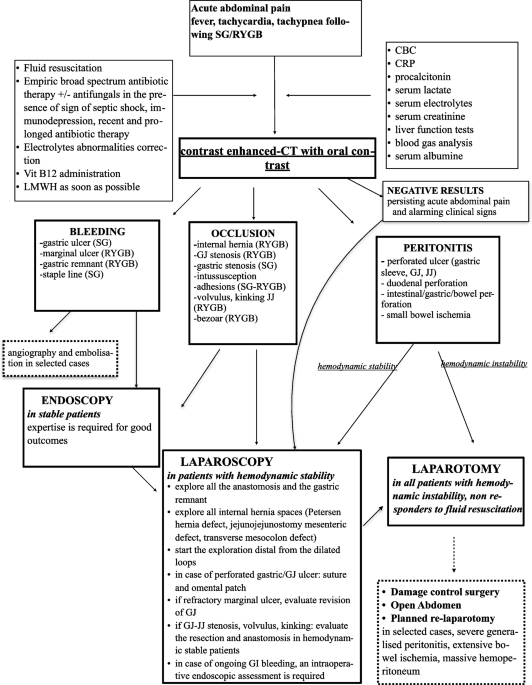
Operative management of acute abdomen after bariatric surgery in the emergency setting: the OBA guidelines, World Journal of Emergency Surgery
Background Patients presenting with acute abdominal pain that occurs after months or years following bariatric surgery may present for assessment and management in the local emergency units. Due to the large variety of surgical bariatric techniques, emergency surgeons have to be aware of the main functional outcomes and long-term surgical complications following the most performed bariatric surgical procedures. The purpose of these evidence-based guidelines is to present a consensus position from members of the WSES in collaboration with IFSO bariatric experienced surgeons, on the management of acute abdomen after bariatric surgery focusing on long-term complications in patients who have undergone laparoscopic sleeve gastrectomy and laparoscopic Roux-en-Y gastric bypass. Method A working group of experienced general, acute care, and bariatric surgeons was created to carry out a systematic review of the literature following the Preferred Reporting Items for Systematic Review and Meta-analysis Protocols (PRISMA-P) and to answer the PICO questions formulated after the Operative management in bariatric acute abdomen survey. The literature search was limited to late/long-term complications following laparoscopic sleeve gastrectomy and laparoscopic Roux-en-Y gastric bypass. Conclusions The acute abdomen after bariatric surgery is a common cause of admission in emergency departments. Knowledge of the most common late/long-term complications (> 4 weeks after surgical procedure) following sleeve gastrectomy and Roux-en-Y gastric bypass and their anatomy leads to a focused management in the emergency setting with good outcomes and decreased morbidity and mortality rates. A close collaboration between emergency surgeons, radiologists, endoscopists, and anesthesiologists is mandatory in the management of this group of patients in the emergency setting.

PDF) Correction: Surgeons' perspectives on artificial intelligence to support clinical decision-making in trauma and emergency contexts: results from an international survey

COVID-19, Two years later: Is the SARS-CoV-2 pandemic still having an impact on emergency surgery? An international cross-sectional survey among WSES members

Bariatric Emergencies — NUEM Blog

SciELO - Brasil - BRAZILIAN CONSENSUS ON THE MANAGEMENT OF INFLAMMATORY BOWEL DISEASES IN PEDIATRIC PATIENTS: A CONSENSUS OF THE BRAZILIAN ORGANIZATION FOR CROHN'S DISEASE AND COLITIS (GEDIIB) BRAZILIAN CONSENSUS ON THE

PDF) The Operative management in Bariatric Acute abdomen (OBA) Survey: long-term complications of bariatric surgery and the emergency surgeon's point of view

World Society of Emergency Surgery Guidelines

Gastrointestinal Disorders, Free Full-Text

Imaging of Bariatric Surgery: Normal Anatomy and Postoperative Complications

Prevention and treatment of nutritional complications after bariatric surgery - ScienceDirect

Hernia as a Complication of Metabolic Bariatric Surgery

The Operative management in Bariatric Acute abdomen (OBA) Survey: long-term complications of bariatric surgery and the emergency surgeon's point of view, World Journal of Emergency Surgery
Professor Zsolt Balogh / Staff Profile / The University of Newcastle, Australia

Imaging of Bariatric Surgery: Normal Anatomy and Postoperative Complications

Operative management of acute abdomen after bariatric surgery in the emergency setting: the OBA guidelines, World Journal of Emergency Surgery

Belinda De Simone on LinkedIn: Operative management of acute abdomen after bariatric surgery in the…









